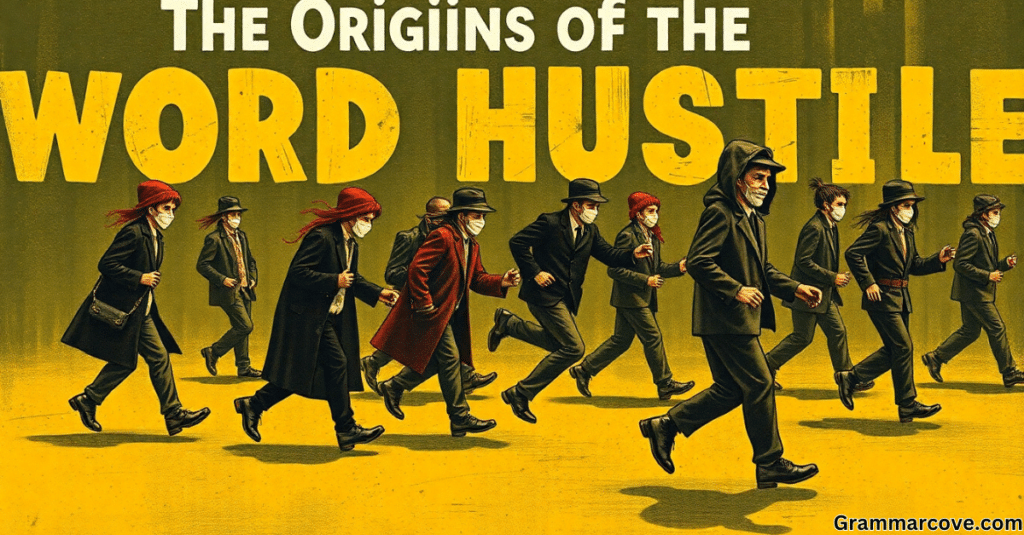In the English language, spelling can sometimes be a tricky thing, especially when words sound the same but are spelled differently. One such example is the debate between hustle and hussle. So, which spelling is correct? In this article, we’ll explore the correct spelling of hustle, the meaning of hustle and hussle, and much more.
Along the way, we’ll provide real-world examples, including emails and scenarios, to illustrate how and when to use each term.
Hustle vs Hussle: A Quick Overview

Before diving deep into examples and detailed explanations, let’s first address the key question: Which spelling is correct?
- Hustle is the correct spelling.
- Hussle is a misspelling that is commonly used but not technically correct in standard English.
The confusion often arises because “hustle” is used so frequently in casual conversations, business environments, and sports lingo. However, the spelling “hussle” is sometimes seen in informal contexts, especially on social media or in pop culture references.
Now that we’ve clarified the basics, let’s explore this further.
The Meaning of Hustle and Hussle
At its core, hustle refers to hard work, effort, and energy put into achieving something. It’s often associated with pushing through challenges or working tirelessly to reach a goal.
On the other hand, hussle is simply a common misspelling of the word hustle, with no distinct meaning or usage in proper English grammar.
Example Scenario: Email on Work Ethic
Let’s consider a business scenario where the correct spelling of hustle is critical. Imagine you’re sending an email to your colleague, Lily, to motivate the team.
Subject: Time to Hustle, Team!
Dear Lily,
I just wanted to remind you that we have a big deadline coming up. I know it’s been tough, but we need to hustle—put in that extra effort and energy. Our team has always been known for its work ethic and determination, and this time won’t be any different. Let’s give it our all!
Best,
James
In this email, using the correct hustle shows professionalism and clarity. If James had used hussle, it would not only have been incorrect but also could have made his message seem less polished.
Hustle Synonyms: Variations on the Theme

If you’re looking to mix things up or use a variety of language in your writing, there are several synonyms for hustle that can convey similar meanings. These include:
- Strive: To make a great effort to achieve or reach something.
- Grind: Often used in the context of hard work, especially with a relentless, daily effort.
- Push: To exert energy or effort in order to reach a goal or overcome an obstacle.
- Work hard: Straightforward but effective.
- Persevere: To continue despite difficulties.
Each of these words can describe hard work and energy, but they might emphasize slightly different nuances. For instance, grind often implies a consistent, ongoing effort, while strive can suggest striving toward a high or noble goal.
Example Scenario: A Motivational Text
Consider a scenario where you’re sending a text to a friend who’s going through a tough time. You could use a variety of hustle synonyms to offer motivation.
Hey Alex,
I know things have been rough at work, but don’t forget how much you’ve accomplished already. You’ve always had the work ethic and determination to push through. Remember, the real success comes from the grind, and you’re more than capable of doing it. Keep going, don’t stop now!
Here, using grind adds an extra layer of grit and determination to the message, reinforcing that success doesn’t come easy.
Hustle in Business and Sports

In both business and sports, the concept of hustling is widely celebrated. Whether it’s staying late to finish a project or sprinting across the field to make a crucial play, hustle means giving your absolute best. Let’s look at how this term is used in these contexts.
Hustle in Business
In the world of business, hustling often refers to working hard, networking, and finding ways to get things done. The term has become synonymous with the startup culture, where long hours, persistence, and adaptability are necessary to succeed. In fact, business leaders often encourage their teams to “hustle” to get ahead of the competition.
Example Scenario: Business Email on Hustle
Subject: Keep Up the Hustle!
Dear Sarah,
I just wanted to say, I really appreciate the energy you’ve been putting into the new marketing campaign. We need to keep the momentum going. Let’s hustle to get those last-minute tweaks finished, and then we can move forward with the launch!
Thanks,
Michael
Here, Michael uses hustle to encourage Sarah to keep putting in the effort. It’s clear, direct, and makes sense in the context of a fast-paced work environment.
Hustle in Sports
In sports, hustle refers to the effort put into every play, the energy spent to be at the top of your game. Coaches often tell players to hustle, meaning they should be fast, aggressive, and fully engaged in every aspect of the game.
Example Scenario: A Coach’s Pep Talk
Coach’s Email to Team
Subject: Time to Hustle on the Field!
Team,
We’re going into this match with one goal in mind—winning. But winning doesn’t come easily. We need to put in the hustle, every second of the game. Hard work and energy will make the difference between a win and a loss. Stay focused and keep pushing yourself.
Let’s do this!
Coach Daniels
This is a classic example of how hustle is used in sports contexts to emphasize effort, focus, and commitment.
The Origins of the Word Hustle

Where did the word hustle come from? The origin of the word hustle dates back to the 17th century. The word itself comes from the Dutch word husselen, which means to shake or jostle. Over time, it evolved to mean to push or force something to happen—reflecting the idea of making things happen through effort, even if it requires some forceful action.
The term gained popularity in the early 20th century and became particularly common in American slang, where it began to be associated with hard work and energy in a more positive sense. It’s now a term widely used across many fields, especially in business, sports, and casual conversations.
Misspelling of Hustle
Despite the correct spelling of hustle, many people still write hussle, especially in informal settings. This misspelling is most commonly seen in casual conversations, social media posts, and even music lyrics. For example, the late rapper Nipsey Hussle adopted the misspelled form for his stage name, and this has contributed to its popularity in certain circles.
However, it’s important to remember that in formal writing and professional environments, hustle should always be used.
Informal Language and Slang
In informal language, especially in slang, people might use hussle to convey the same idea of hard work or persistence, but this is not standard English. Using hussle in your casual conversations or creative projects might be acceptable, but be cautious about using it in more formal contexts, like professional emails or business reports.
Why Spelling Matters: Work Ethic and Determination

“To recap, the correct spelling is hustle, not hussle. If you’re wondering about hustle-or-hussle-which-is-correct, the answer is clear: hustle is the proper spelling. The words we use say a lot about us, especially in professional and business settings. Whether you’re talking about hustle in business, sports, or personal endeavors, the correct spelling communicates focus, effort, and a commitment to success. Hustle conveys a sense of determination, energy, and a strong work ethic, while the misspelling hussle could come across as careless or uninformed. While hussle may pop up in informal or slang contexts, it’s a misspelling and not appropriate in formal writing.”
When you choose the correct spelling of hustle, you’re not only using the right word; you’re also communicating that you care about accuracy and professionalism. It may seem like a small detail, but attention to detail is often a key part of work ethic and determination.
Conclusion: Hustle or Hussle?
“To recap, the correct spelling is hustle, not hussle. If you’re wondering about hustle-or-hussle-which-is-correct, the answer is clear: hustle is the proper spelling. Whether you’re talking about hustle in business, sports, or personal endeavors, the correct spelling communicates focus, effort, and a commitment to success. While hussle may pop up in informal or slang contexts, it’s a misspelling and not appropriate in formal writing.”
So, next time you’re drafting an email, sending a text, or talking about your latest project, remember to use hustle—and convey that you’re ready to put in the hard work and energy needed to succeed.

Steel Morgan is an experienced blogger passionate about language and writing. On Grammarcove. he shares his expertise in grammar, punctuation, and effective communication, making complex rules simple and accessible for readers. With a knack for clear explanations and engaging content, Steel aims to help others master the art of language.







